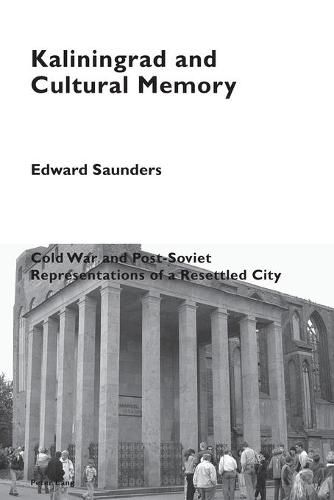Readings Newsletter
Become a Readings Member to make your shopping experience even easier.
Sign in or sign up for free!
You’re not far away from qualifying for FREE standard shipping within Australia
You’ve qualified for FREE standard shipping within Australia
The cart is loading…






This title is printed to order. This book may have been self-published. If so, we cannot guarantee the quality of the content. In the main most books will have gone through the editing process however some may not. We therefore suggest that you be aware of this before ordering this book. If in doubt check either the author or publisher’s details as we are unable to accept any returns unless they are faulty. Please contact us if you have any questions.
In 1945, the Soviet Union annexed the East Prussian city of Koenigsberg, later renaming it Kaliningrad. Left in ruins by the war, the home of Immanuel Kant became a Russian city, a source of historical and cultural fascination for settlers, former inhabitants, visitors and observers alike. New settlers replaced the German population in the years that followed. This book looks at three aspects of Kaliningrad’s relationship to the memory of Koenigsberg through cultural and literary sources and visual representations. First, it addresses the symbolism of Koenigsberg as a memory site in German culture and nostalgia for the city after 1945. Second, it discusses imagined and satirical literary-cultural adaptations and deconstructions of the idea of Kant and Koenigsberg during the Cold War and afterwards. Third, it explores and reflects on discourses of memory, history and nostalgia in representations of the city by poets, photographers and filmmakers visiting Kaliningrad from the 1960s onwards. The book provides an introduction to the memory debates relating to Koenigsberg-Kaliningrad, as well as new critical readings of literary texts, films and photographic works.
$9.00 standard shipping within Australia
FREE standard shipping within Australia for orders over $100.00
Express & International shipping calculated at checkout
This title is printed to order. This book may have been self-published. If so, we cannot guarantee the quality of the content. In the main most books will have gone through the editing process however some may not. We therefore suggest that you be aware of this before ordering this book. If in doubt check either the author or publisher’s details as we are unable to accept any returns unless they are faulty. Please contact us if you have any questions.
In 1945, the Soviet Union annexed the East Prussian city of Koenigsberg, later renaming it Kaliningrad. Left in ruins by the war, the home of Immanuel Kant became a Russian city, a source of historical and cultural fascination for settlers, former inhabitants, visitors and observers alike. New settlers replaced the German population in the years that followed. This book looks at three aspects of Kaliningrad’s relationship to the memory of Koenigsberg through cultural and literary sources and visual representations. First, it addresses the symbolism of Koenigsberg as a memory site in German culture and nostalgia for the city after 1945. Second, it discusses imagined and satirical literary-cultural adaptations and deconstructions of the idea of Kant and Koenigsberg during the Cold War and afterwards. Third, it explores and reflects on discourses of memory, history and nostalgia in representations of the city by poets, photographers and filmmakers visiting Kaliningrad from the 1960s onwards. The book provides an introduction to the memory debates relating to Koenigsberg-Kaliningrad, as well as new critical readings of literary texts, films and photographic works.